Classic Studies on Justification (19 vols.)
Digital Logos Edition
Overview
Justification by faith alone was a central doctrine of the Reformation and remains the crux of countless theological debates.
Supplying a balanced survey of the theology of justification, this collection gathers the timeless work of theologians from Lutheran, Catholic, Reformed, Wesleyan, Anglican, and other traditions. Volumes from John Henry Newman, John Owen, John Wesley, John Brown, and others interlock to provide you with a comprehensive picture of how Christians have understood justification through the centuries.
In the Logos editions, these volumes are enhanced by amazing functionality. Important terms link to dictionaries, encyclopedias, and a wealth of other resources in your digital library. Perform powerful searches to find exactly what you’re looking for. Take the discussion with you using tablet and mobile apps. With Logos Bible Software, the most efficient and comprehensive research tools are in one place, so you get the most out of your study.
John Henry Newman’s Lectures on Justification, James Buchanan’s The Doctrine of Justification, and George Stanley Faber’s The Primitive Doctrine of Justification Investigated are already available to purchase and download separately. If you own any of these volumes, your final bid will be discounted once the product ships.

Key Features
- Supplies a balanced survey of justification theology across a variety of traditions
- Includes volumes from John Henry Newman, John Owen, John Wesley, and other notable theologians
- Provides a comprehensive picture of how Christians have understood justification through the centuries
Product Details
- Title: Classic Commentaries and Studies on Justification
- Volumes: 19
- Pages: 5,717
- Resource Type: Treatises
- Topic: Soteriology/Salvation
Individual Titles
- A Treatise on Justification by Faith by Paton J. Gloag
- Imputed Righteousness, or a Treatise on Justification by Faith by Peter Haslam
- Aspasio Vindicated, and the Scripture Doctrine of Imputed Righteousness Defended by James Hervey, John Wesley, and William Cudworth
- Life of Justification Opened: A Treatise Grounded upon Galatians 2:11 by John Brown
- Saving Faith, As Laid Down in the Word of God, and Maintained in Confessions of the Reformed Churches by John Anderson, Ebenezer Erskine, and William Cudworth
- Sermons, Chiefly on Doctrinal Subjects by John Colquhoun
- Treatises on Justification and Regeneration by John Witherspoon
- The Doctrine of Justification by Faith through the Imputation of the Righteousness of Christ by John Owen
- Justification by Faith Alone by John Berridge and John Wesley
- The Doctrine of Justification by Matthias Loy
- A Treatise on Justification by George Holden
- The Catholic Doctrine on Justification Explained and Vindicated by Francis Patrick Kenrick
- A Treatise on Justification by George Junkin
- Imputative Righteousness Truly Stated According to the Tenour of the Gospel by Richard Baxter
- The Doctrine of Justification and the Harmony of the Apostles Paul and James by Anonymous
- An Attempt to Explain and Establish the Doctrine of Justification by Faith Only in Ten Sermons by James Thomas O’Brien
- The Doctrine of Justification: An Outline of Its History in the Church and of Its Exposition from Scripture by James Buchanan
- The Primitive Doctrine of Justification Investigated, Relatively to the Definitions of the Church of Rome and the Church of England by George Stanley Faber
- Lectures on Justification by John Henry Newman
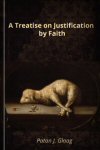
Believing that “justification by faith is not a theoretical dogma, but a great practical inquiry,” Paton J. Gloag wrote this treatise on justification for the general reader. Gloag defends the doctrine of justification by faith alone as the central doctrine of Protestantism, and addresses perversions of the doctrine that diminish it to a mere excuse for ungodliness. Gloag also frequently dialogues with the works on justification of his contemporaries—including John Henry Nowman, Devenant, and Owen.
Paton J. Gloag was minister of Blantyre. He is the author of An Introduction to the Pauline Epistles, Introduction to the Johannine Writings, and A Critical and Exegetical Commentary on the Acts of the Apostles.
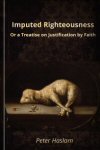
In this volume, Peter Haslam defends justification by faith, or imputed righteousness, as the central doctrine of Christianity. While interacting with the writings of both Church Fathers and modern writers, Haslam’s study primarily focuses on capturing the Bible’s words on justification. Viewing his subject as essential to the life of every Christian, he writes in a clear and concise voice, fit for the general reader.
Peter Haslam was a nineteenth-century English clergyman and theologian.
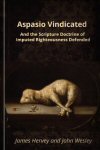
This historical work gathers the correspondence of John Wesley and James Hervey on the subject of justification by faith, capturing the beginning of their public feud. In these letters, Wesley responds to Hervey’s work, Theron and Aspasio—a work many considered to be antinomian—and Hervey responds to Wesley’s objections. The result is a fiery exchange that sheds light on critical debates within the Church of England and the dawn of the Wesleyan tradition.
James Hervey (1714–1758) was an English clergyman, writer, and poet. While studying at Oxford, he joined John Wesley as a member of the Holy Club, but later adopted a Calvinistic creed.
John Wesley (1703–1791) is recognized as the founder of Methodism. His collected works are available in the John Wesley Collection (29 vols.). An acclaimed preacher, Wesley traveled extensively on horseback and drew large crowds for his outdoor sermons. A contemporary of William Wilberforce, Wesley was a strong voice opposing slavery in England and the United States. His influence upon modern Christianity can be seen by the large number of Methodist organizations in the Wesleyan tradition all over the world.
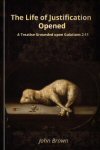
Scottish minister John Brown carries forward the Christian’s struggle to “discern the difference between law and gospel, the covenant of works and that of grace, the legal and evangelical justification.” Brown identifies this struggle as the main source of theological errors among Christians and focuses on Paul’s rebuke of Peter for propagating legal traditions as prerequisites for entrance into Christian community.
John Brown (1722–1787), was a Scottish divine and author. His works are collected in the The Works of John Brown of Haddington (14 vols.), and include The Self-Interpreting Bible, The Dictionary of the Bible, and The Systematic Theology of John Brown.
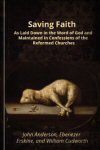
Gathering the insights of Scottish, English, and American clergymen in the Reformed tradition, this three-in-one volume is a well-rounded defense of justification by faith. The text includes John Anderson’s The Scripture Doctrine of the Appropriation Which Is in the Nature of Saving Faith, Ebenezer Erskine’s The Assurance of Faith Opened and Applied, and William Cudworth’s Aphorisms concerning the Assurance of Faith.
John Anderson (1748–1830) was a Presbyterian theologian. He was born in the far north of England, by the River Tweed. He was brought up as a member of the (Secession) Church of Scotland and became a pastor. He sailed to the United States in June 1783, and was ordained in Philadelphia in 1788. He later became the founding professor of the first Presbyterian seminary in America, Pittsburgh Theological Seminary, founded in 1794.
Ebenezer Erskine (1680–1754) was a Scottish minister whose actions led to the establishment of the Secession Church in Scotland. His works are collected in The Whole Works of the Rev. Ebenezer Erskine (3 vols.). Erskine’s father was a victim of the Great Ejection under the Act of Uniformity in 1662, and was imprisoned for several years during Ebenezer’s childhood. Ebenezer studied at the University of Edinburgh and then became minister of Portmoak, where he served for 28 years, until he moved to the West Church in Stirling, where he served for 23 years.
Following in his fathers footsteps, he was rebuked at the General Assembly in 1722 for defending the doctrines found in The Marrow of Modern Divinity. In 1733 he was suspended because of his democratic stance on lay patronage. In protest, Erskine and the other suspended ministers formed their own church court, no longer acknowledging the authority of the General Assembly. This eventually lead to Ebenezer being deposed, though he continued to preach to a large and influential congregation in Stirling until his death in 1754.
William Cudworth was an eighteenth-century English clergyman in Norwich.
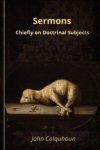
Presented in 14 sermons, this work provides a complete picture of Christian redemption from a Reformed perspective. Scottish minister John Colquhoun preaches through the Incarnation, Christ as servant of the Father, imputed righteousness, union with Christ, justification, sanctification, and salvation.
John Colquhoun (1748–1827) was a Scottish minister in Edinburgh. He was educated at Glasgow University and was greatly influenced by Thomas Boston’s Fourfold State.
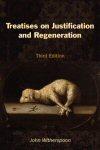
In this work, John Witherspoon responds to the writings of Calvinist theologian James Hervey. Witherspoon emphasizes the importance of imputed righteousness’ connection to righteous living. Working out of Jesus’ conversation with Nicodemus in the Gospel of John, Witherspoon argues that, though we are justified through faith alone, holy living always accompanies the truly regenerated spirit. This volume also includes an introductory essay by William Wilberforce.
John Witherspoon (1723–1794) was a Presbyterian minister, president of what is now Princeton University, and a signatory of the US Declaration of Independence. His works are collected in The Works of the Rev. John Witherspoon (4 vols.).
Witherspoon was born in East Lothian, Scotland. He studied divinity at the University of St. Andrews and the University of Edinburgh. He became a minister in the (Presbyterian) Church of Scotland in 1745 and served in Ayrshire and Paisley until 1768 when he immigrated to North America to become the sixth president of the College of New Jersey at Princeton. He instituted numerous reforms and taught several courses during his time as president.
Witherspoon disagreed with the growing British interference in the colonies and supported the American Revolution as part of New Jersey’s congressional delegation. As a politician, he was a staunch nationalist and republican; as a minister he was an Evangelical opponent of the Moderate Party of the Church of Scotland. He died in 1794 and is buried in the Princeton Cemetery.
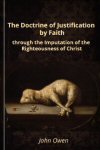
The great theologian John Owen explains justification from his Puritan perspective. Owen also provides practical analysis of how justification plays out in the lives of Christians, and answers objections to the doctrine of justification by faith alone.
John Owen (1616–1683) is considered one of the most influential theologians of the seventeenth century. He entered Queen’s College, Oxford, at the age of 12 and completed his MA in classics and theology at the age of 19.
His first parish was at Fordham in Essex where he became convinced that the Congregational polity was the scriptural form of church government. In the 1640s he became chaplain to Oliver Cromwell, and traveled with him on his expeditions to Ireland and Scotland.
In 1651 he was appointed dean of Christ Church and in 1652 made vice-chancellor of Oxford—positions which allowed him to train ministers for the Cromwellian state church. Owen later moved to London and led the Puritans through the bitter years of religious and political persecution—experiences which shaped his theological inquiry, pastoral reflection, and preaching. Owen authored Temptation and Sin, and one of the richest commentaries on the book of Hebrews, An Exposition of the Epistle to the Hebrews (7 vols.) which are also included in The Works of John Owen (24 vols.), along with other sermons and essays.
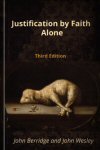
In this letter, English clergyman John Berridge explains the doctrine of justification through personal experience of God’s work in his life. An expression of the dawn of Methodism, Berridge’s letter emphasizes the instantaneous nature of justification and how true conversion is accompanied by a transformed life. This volume includes an introductory essay from John Wesley.
John Berridge (1716–1793) was an evangelical Anglican clergyman and a hymn writer. In the prime of his career he preached a dozen sermons a week and was commended by John Wesley as “one of the most simple as well as most sensible men of all whom i pleased God to employ in reviving primitive Christianity.”
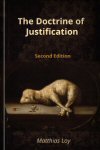
Commemorating the 350th anniversary of the Reformation, Lutheran theologian Matthias Loy emphasizes the importance of justification by faith as the doctrine without which “the church could not live and flourish.” Loy celebrates the contributions of Luther and other Reformers, his aim being to “illustrate this old truth as the Bible contains it and the church of the Reformation confesses it.”
Matthias Loy (1828–1915) was an American Lutheran theologian in the Evangelical Lutheran Joint Synod of Ohio. Loy was a prominent pastor, editor, author, and hymn writer, and served as president of Capital University, Columbus, Ohio.
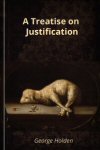
This broad study of justification, Scottish theologian George Holden surveys the doctrine of justification in the writing of theologians from the Church Fathers and modern theologians. Holden systematically works through the nature, means, and Christian experience of justification, writing in concise and accessible language.
George Holden (1783–1865) was a theological writer and accomplished Hebraist. He was educated at Glasgow University and is the author of An Attempt towards an Improved Translation of the Proverbs of Solomon and An Attempt to Illustrate the Book of Ecclesiastes.

In this volume, Irish Catholic Francis Patrick Kenrick responds to the Reformation doctrine of justification by faith alone. He presents the Catholic perspective of justification in the Bible and Christian tradition, and examines the relevance of sacraments, purgatory, good works, and other Catholic doctrines to justification.
Francis Patrick Kenrick (1796–1863) was an Irish Catholic cleric. He served as the bishop of Philadelphia as well as Archbishop of Baltimore. He also published a noted translation of the Vulgate Bible.
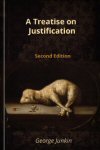
Responding to revivalist movements, Presbyterian minister George Junkin emphasizes the importance of a thorough and correct understanding of justification by faith alone. Junkin calls for absolute reliance on Scripture and thorough exegetical preaching, and for Christians to cling anew to the doctrines of the Reformation.
George Junkin (1780–1868) was an American educator and Presbyterian minister. He was the first president of Lafayette College and was later president of Miami University and Washington and Lee University.
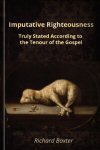
English theologian Richard Baxter defends the Reformation doctrine of justification. Baxter places justification at the center of the Christian faith and calls for a balanced view that neither uses Reformed doctrine as an excuse for unrighteousness, but rebukes works-based salvation.
Richard Baxter (1615–1691) was an English pastor and theologian. Though never attended university, he was a voracious learner. In 1633 he had a brief experience of court life at Whitehall, but turned from the court in disgust and studied theology. In 1638 he was ordained by the bishop of Worcester and preached in various places till 1641, when he began his ministry at Kidderminster. Many of his works are collected in The Practical Works of the Rev. Richard Baxter (23 vols.).
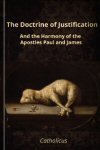
In these three anonymous public letters, a clergyman harmonizes the soteriology in James and Paul’s letters. The author defends the doctrine of justification by faith alone, arguing that a correct reading of James does not contradict this doctrine or conflict with Paul’s letters. He also responds specifically to the treatise on justification by the Irish bishop of Ossory, James Thomas O’Brien (1792–1874).
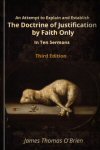
In 10 sermons, Irish bishop of Ossory James Thomas O’Brien examines the nature of justification and faith and the effects they have upon a Christian’s life. O’Brien asserts the true faith is always accompanied by moral transformation and answers several objections to justification by faith alone.
James Thomas O’Brien (1792–1874) was a fellow of Trinity College at the University of Dublin and the bishop of Ossory, Ireland.
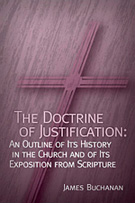
In this volume, James Buchanan responds to some of his contemporaries attacks of Reformation doctrines. Buchanan surveys the history of thought on justification from the Church Fathers to the nineteenth century, and examines biblical foundations of the doctrine.
James Buchanan (1804-1870) was a Scottish minister and theologian, ordained in the Church of Scotland in 1827. He is the author of The Office and Work of the Holy Spirit.In 1828 he commenced a very successful ministry at North Leith where he gained a great reputation as an earnest and eloquent preacher of the Word of God. In 1845 he was appointed to the Chair of Apologetics at New College, Edinburgh, and in 1847 he succeeded Chalmers as Professor of Systematic Theology. He retired in 1868 and died two years later.
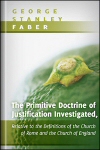
Elucidating the distinctions on the doctrine of justification between the Catholic Church and the Church of England, George Stanley Faber’s The Primitive Doctrine of Justification Investigated explores the texts of the early Church Fathers to determine how they viewed justification. A major doctrinal difference between these two churches, Faber’s exhaustive research and articulate observations shed light on this long-standing disagreement.
George Stanley Faber (1773–1854) was a prolific author and Anglican theologian educated at University College, Oxford. In 1801 he was a Bampton lecturer at the University of Oxford. A controversial writer, he published over 20 books, most of which provoked discussion and debate. Several of his works are collected in the Selected Works of George Stanley Faber (7 vols.).
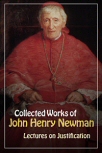
John Henry Newman delivered these lectures in the early 1830s, during his career as a professor of theology. Lectures on Justification uncovers the scriptural and historical understanding of justification within a sacramental tradition. Throughout these lectures, Newman defends justification as a free gift of God received through the sufficiency of Christ’s sacrifice. The lecture series closes with special attention given to the role of the sacramental rites in the faith of the believer, and the importance of preaching the Gospel of Jesus Christ as presented in Scripture.
John Henry Newman (1801–1890) was an important figure in the religious history of England in the nineteenth century. He was known nationally by the mid-1830s. Originally an evangelical Oxford academic and priest in the Church of England, Newman was a leader in the Oxford Movement. This influential grouping of Anglicans wished to return the Church of England to many Catholic beliefs and forms of worship traditional in the medieval times to restore ritual expression. In 1845, Newman left the Church of England and was received into the Roman Catholic Church where he was eventually granted the rank of cardinal by Pope Leo XIII.
He was instrumental in the founding of the Catholic University of Ireland, which evolved into University College, Dublin. Newman’s beatification was officially proclaimed by Pope Benedict XVI on September 19, 2010 during his visit to the United Kingdom.
Newman’s major writings include his autobiography, Apologia Pro Vita Sua, The Grammar of Assent, and the poem “The Dream of Gerontius.”
Reviews
1 rating

Forrest Cole
11/9/2021

Jim McGarigle
10/19/2017
Calvinists, Catholics & Methodists oh my! 1 Lutheran! Probably one who had synergistic leanings. Phooey!
Stephen Steele
4/22/2015
The Life of Justification is by John Brown of Wamphray, not of Haddington (it was published before Haddington was born). See James Walker's The Theology & Theologians of Scotland (Edinburgh, 1888), p. 24 - which is an important resource that Logos doesn't currently have.